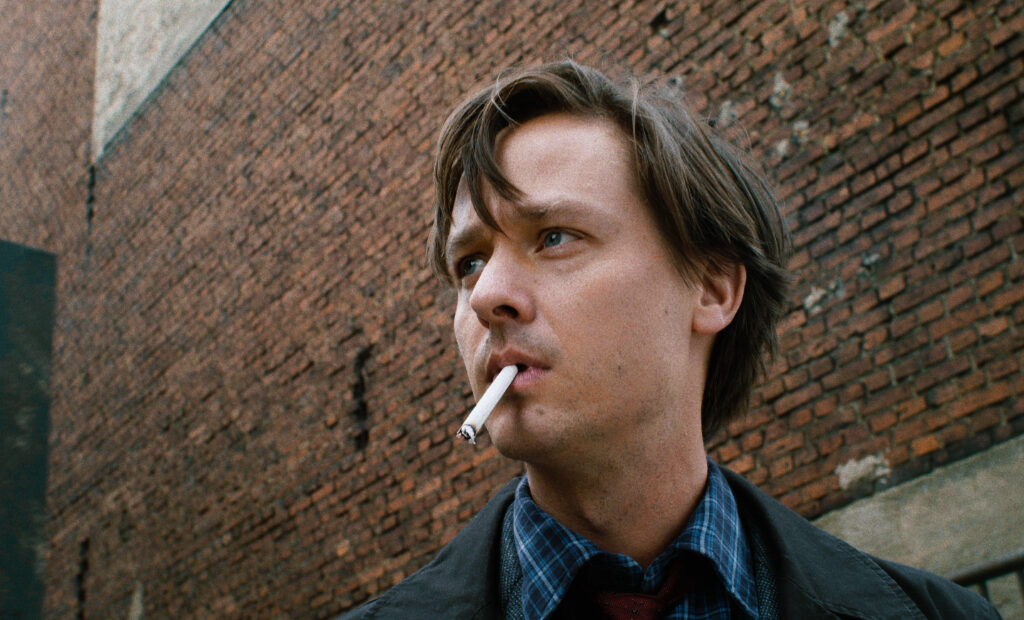“I am not the kind of actor who is really interested in mimicry”: Tom Schilling on Fabian – Going to the Dogs

Tom Schilling is a Berlinale regular. Since 2015 the prolific Berlin actor has been steadily represented at the festival with a project every other year (2015: Woman in Gold, 2017: The Same Sky, 2019: Brecht).
This year he has two features in the lineup: while Me and the Others is part of Berlinale Series, he is also competing for the coveted Golden Bear award with Fabian – Going to the Dogs. The latter is an adaptation of Erich Kästner’s semi-autobiographical novel. Directed by Dominik Graf, the titular protagonist (Schilling) traverses 1931 Berlin, struggling against its moral downfall. Schilling spoke to us about his approach to historical characters, dancing on the volcano and whether he could soon be found on the other side of the camera.
How close is Fabian to author Erich Kästner’s real life?
Tom Schilling: I can only assume, but it feels like this is the most personal book Kästner wrote. The character is quite similar to him as he, too, is shell shocked and traumatised from World War I. Like Kästner he has a little bit of a drinking problem. Nightlife plays a big part, voyeurism in a way, and affairs. The most obvious comparison is both being writers. I wasn’t too familiar with Erich Kästner before making this film. Of course, I knew his children’s books. But in preparation for the film, I obviously did some research on him and read a lot of his poems, which I adore.
When you work on a character like Fabian and you know there are autobiographical elements, do you also, in a way, play a version of Erich Kästner? And vice versa, when you play real people (eg Brecht, Hitler) do you approach them as fictitious characters?
TS: That is a difficult question. I said to myself that I don’t want to play “real” characters anymore because I find it very stressful. The critics, the audience, everyone has expectations of how this character has to be. I am not the kind of actor who is really interested in mimicry. I don’t usually go into this metamorphosis. Instead, I try to find an emotional core of the character and it doesn’t matter if it is a fictional or a “real” character, I try to play them through my emotional range.
Do you think that talking about the period this film is set in is particularly relevant to the world we live in now?
TS: Yes, I think it is. This is not a new analysis, but I think the extreme times within Europe, especially in Germany before the Second World War and all the hatred within the political debate, there are references to our time. We are forced into that hysteria for some reason. I think many people are quite reasonable, but the circumstances, society, press and social media kind of force us into this hatred.
When films portray the Weimar Republic, with its impending doom there comes also a form of decadence. Was this part of the allure of this project?
TS: To be perfectly honest, I am a bit bored of this “dancing on the volcano”. We have some films about this, we have Berlin Babylon, and even when I think of Der Untergang [Downfall], they had this concept later in the Führerbunker. It’s quite a German thing, I think, so I am very familiar with it. What I am most proud of in Fabian is that to me it is a very tender love story – that is what I liked most.
When we watch historical films, to an extent we know what will happen. Is it challenging to play a character who is not aware of the turn history will take, when you yourself do?
TS: I don’t think it is a challenge because in every film I do as an actor, I know the ending. I am always ahead of the character. So it is my job in each scene to be in the moment and forget about everything that lays ahead. I concentrate on the here and now of the character.
There are quite a lot of historical dramas in your filmography. Is this a deliberate choice?
TS: I don’t have the numbers in general how many films take place nowadays and how many films are historical – maybe it is the same. But I choose the films I do out of curiosity for the character, for the director and for the story. I don’t care too much when they take place.
Many of your films have a strong connection to Berlin. Do you seek to explore the city and its history through the universe of movies?
TS: I think… I was about to say it’s pure coincidence. But maybe my own biography has something to do with the characters I can play. I was born in the GDR, I experienced seven years of the German Democratic Republic. I experienced all the changes after the wall came down – maybe that gives something to my ability to portray certain characters.
What was it like working with Dominik Graf?
TS: I wanted to work with Dominik for probably 20 years. I am a big fan of his work. His reputation is quite interesting because each and every actor I spoke to said, “He is adorable, he is such a lovely director.” Then you have the gossip of producers that he is hard to work with.
When you work with him, you see he is a very passionate director, who has a great tenderness and is hungry for truth, hungry for life. Sometimes all the technical stuff and production numbers can somehow get in his way. It was a great experience and I can say from the bottom of my heart that I truly love him as a director.
Speaking of directors, your friend Daniel Brühl is competing against Fabian with his directing debut. Do you ever think about directing a film?
TS: I would only direct a film – and maybe I will someday – because I’d want to tell a certain story, a story that is very dear to me. I would need to feel the urge. I have no ambition just to direct. I haven’t got that story yet.
Selina Sondermann
Fabian – Going to the Dogs does not have a UK release date yet.
Read our review of Fabian – Going to the Dogs here.
Read more reviews from our Berlin Film Festival 2021 coverage here.
For further information about the event visit the Berlin Film Festival website here.
Watch the trailer for Fabian – Going to the Dogs here:


























Facebook
Twitter
Instagram
YouTube
RSS